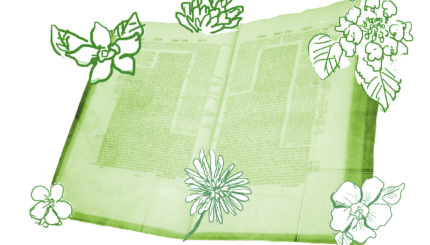Commentary on Parashat Bechukotai, Leviticus 26:3 - 27:34
Our Torah portion this week, Bechukotai, is the last portion of Leviticus. Bechukotai ends with the tokhahah, a warning, promising defeat, massacre, and the pain of exile if one disobeys God.
Jeremiah, a prophet who wrote during the closing days of the Kingdom of Judah struggled to find meaning during the time of the destruction of the Temple. We hear his words in our Haftarah portion (reading from the Prophets or Writings that follows the Torah reading) this week. In his bitterness he cried: The guilt of Judah will be inscribed with a stylus of iron… (Jeremiah 17:1).
Despite all that he saw, Jeremiah expressed deep faith that God is the living water that sustains us all. He wrote, “He shall be like a tree planted by waters, sending forth its roots by a stream: It does not sense the coming of heat, its leaves are ever fresh; it has no care in a year of drought, it does not cease to yield fruit” (Jeremiah 17:8).
Your Haftarah Navigator
1. According to Jeremiah, who is like a tree planted by waters?
2. How does faith in God help us through difficult times?
3. In your experience, have you turned to God, to prayer, to faith when life was difficult?
Jeremiah experienced tumultuous times. He was a sensitive soul who saw it all. Destruction. Defeat. Hopelessness. And yet, Jeremiah was also able to find within himself his hope, his faith that rose from the deep recesses of his heart.
The following text, expanded, became one of the 19 blessings in our Amidah (silent benediction, a central prayer). Jeremiah saw much of life. Still, the Haftarah ends with a hopeful note, “Heal me, O Lord, and let me be healed; save me, and let me be saved; for You are my glory” (Jeremiah 17:14).
1. What is the relationship between prayer and healing? What does God have to do with healing?
2. Have you ever prayed for someone who is ill? Does it work? What is the purpose of a prayer for healing?
A Word
This is indeed a sobering text. Jeremiah understood Jewish suffering as something that was deserved. A rebellious people are finally punished by a God whose patience has finally run out.
READ: When Bad Things Happen to Good People
Thousands of years after Jeremiah, we human beings still experience these evils: defeat, pain, suffering. We experience the devastation of illness, the pain of a breakup of a family. Today, though, most of us do not see these tragedies as punishment for our sins.
Conversely, many people wonder at these moments of pain and disappointment if God is indeed there at all. The question of today is different. We ask ourselves, “How does one continue to believe, to let God in, when such devastation surrounds us at times?” Pain can harden one’s heart. It can make a person cynical, mistrustful of others.
These days are the in-between days — days of reflection and sadness between Passover and Shavuot. Why? Because during these days we commemorate the wandering in the wilderness. The time between our freedom from Pharaoh and our receiving the gift of Torah at Mount Sinai.
During that time we were lawless. We had no Torah. We had too much freedom. Instead of it being a wonderful party, it was awful. We complained bitterly. The law, as the midrash teaches, brought true freedom to the world, a freedom that we could sustain.
For those of us in the northern hemisphere, this season also means that the summer warmth is coming. Some of us feel relief, now that the academic year is ending, granting us a liberation from the constraints of imposed order. Now, as summer approaches, we experience the freedom without laws. We feel rootless.
Maintaining faith in difficult times is a struggle for each of us. And yet, Jeremiah’s beautiful, poetic words strike a chord for us, who want so desperately to feel God’s presence beside us as we struggle. Jeremiah offers these words of consolation and hope, describing that a person who has faith in God can survive even the toughest times.
Lag B’Omer, a holiday day that is a reprieve in our 50 days of mourning between Passover and Shavuot, also occurs during this time. In the spirit of Lag B’Omer, let us feel the reprieve of the water around us, soothing our roots, caring for our leaves. And may we soon yield fruit again. As Jeremiah says, “Heal me, O Lord, and let me be healed. Save me, and let me be saved. For you are my glory.”
Parshat Bechukotai ends the book of Leviticus. When the Torah reading is completed, it is customary for the congregation to chant, “Chazak, chazak, v’nithazek.” Be Strong. Be Strong. And let us be strengthened by one another.
So may it be.
Reprinted with permission from Hillel: The Foundation for Jewish Campus Life.
Haftarah
Pronounced: hahf-TOErah or hahf-TOE-ruh, Origin: Hebrew, a selection from one of the biblical books of the Prophets that is read in synagogue immediately following the Torah reading.
parsha
Pronounced: PAR-sha or par-SHAH, Origin: Hebrew, portion, usually referring to the weekly Torah portion.
Torah
Pronunced: TORE-uh, Origin: Hebrew, the Five Books of Moses.


